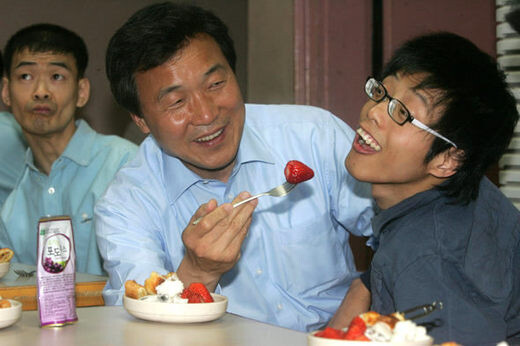hankyoreh
Links to other country sites 다른 나라 사이트 링크
United Democratic Party considers a turn to the right

The main opposition United Democratic Party has not put enough effort into finding what caused its back-to-back defeat in the presidential and parliamentary elections, but now is hastily preparing to hold a general convention in mid-June in an attempt to rebuild the party.
Party officials are paying close attention to who the new chairman will be. At a time when the number of available positions within the party has declined significantly and government subsides have been reduced to around 60-70 percent of the previous level, the two factions within the party - members of the defunct United New Democratic and Democratic Parties - are finding that they have to take care of their own people. The UDP was re-configured before the recent National Assembly election via a merger between the United New Democratic Party and Democratic Party. The party secured just 81 seats in the nation’s 299-seat Assembly in the April 9 election.
Externally, party members appear to be pushing their political views, but a closer look shows that they are actually striving to secure their own hegemony, including the chairmanship and even the next presidential bid.
UDP Chairman Sohn Hak-kyu is putting top priority on the livelihood of the general public. He is calling for a “new liberalism” and a “third way,” meaning that he wants the party to transform itself. Sohn is in favor of a Seoul-Washington free trade deal, and seems to be arguing that the party move more to the right. Meanwhile, Park Sang-cheon, the party’s co-chairman, is pushing for a move to the center, saying that it is necessary for the party to be competitive, which will require the party to adjust itself away from its current pro-egalitarian stance.
If these arguments hold true, the two leaders must first admit that the UDP failed to win both elections because it was too far to the left. Kim Ho-ki, a Yonsei University professor who attended a recent seminar held by the UDP, told participants that progressive ivory-tower professors in are now turning their backs on the opposition party. He explained that they can no longer find any reason to support the UDP, and that a growing number of them are moving either toward the Democratic Labor Party or the New Progressive Party, both of which are viewed as being farther to the left.
Some say that those pushing to go to the center or right have failed to provide any concrete policy alternatives, giving a hollow ring to their arguments and making it appear as though they are blindly following the conservative line. Critics say, for example, that Park Sang-cheon is seeking to adjust the party line in order to help his Honam faction secure control.
UDP floor leader Kim Hyo-seuk insists that the party should modernize itself and become a block that advocates for livelihood protection measures. This seems to make more sense for the party, but if he fails to provide concrete policy alternatives, his arguments will be the same as those of Sohn and Park.
Chun Jung-bae is of the opinion that the party should build a center-progressive block. The hitch here is that most of the progressive members of the party lost their bids in the parliamentary election, meaning that they do not have enough momentum to drive the party forward.
Is there a future for the UDP? Some worry that the party could now become powerless or be reduced to the status of a minor regional political block with a base in the Jeolla Provinces, the party’s stronghold. Have its election defeats caused it to hit bottom? Unfortunately, many insiders say that it has not, heralding that the party might be headed further downhill in the near future.
Is there a future for the UDP? Some worry that the party could now reduced to the status of a minor regional political block. Have its election defeats caused it to hit bottom? Unfortunately, many insiders say that it has not, heralding that the party might be headed further downhill in the near future.
Please direct questions or comments to [englishhani@hani.co.kr]
Editorial・opinion
![[Column] The state is back — but is it in business? [Column] The state is back — but is it in business?](https://flexible.img.hani.co.kr/flexible/normal/500/300/imgdb/original/2024/0506/8217149564092725.jpg) [Column] The state is back — but is it in business?
[Column] The state is back — but is it in business?![[Column] Life on our Trisolaris [Column] Life on our Trisolaris](https://flexible.img.hani.co.kr/flexible/normal/500/300/imgdb/original/2024/0505/4817148682278544.jpg) [Column] Life on our Trisolaris
[Column] Life on our Trisolaris- [Editorial] Penalties for airing allegations against Korea’s first lady endanger free press
- [Editorial] Yoon must halt procurement of SM-3 interceptor missiles
- [Guest essay] Maybe Korea’s rapid population decline is an opportunity, not a crisis
- [Column] Can Yoon steer diplomacy with Russia, China back on track?
- [Column] Season 2 of special prosecutor probe may be coming to Korea soon
- [Column] Park Geun-hye déjà vu in Yoon Suk-yeol
- [Editorial] New weight of N. Korea’s nuclear threats makes dialogue all the more urgent
- [Guest essay] The real reason Korea’s new right wants to dub Rhee a founding father
Most viewed articles
- 160% of young Koreans see no need to have kids after marriage
- 2[Column] Life on our Trisolaris
- 3New sex-ed guidelines forbid teaching about homosexuality
- 4Presidential office warns of veto in response to opposition passing special counsel probe act
- 5How daycares became the most viable business for the self-employed
- 6OECD upgrades Korea’s growth forecast from 2.2% to 2.6%
- 7Amid US-China clash, Korea must remember its failures in the 19th century, advises scholar
- 8Months and months of overdue wages are pushing migrant workers in Korea into debt
- 9[Column] The state is back — but is it in business?
- 10[Guest essay] Maybe Korea’s rapid population decline is an opportunity, not a crisis